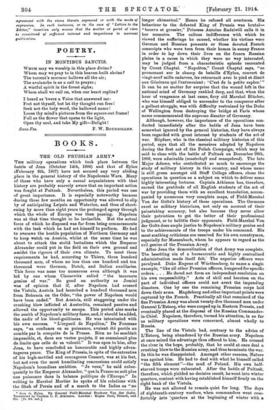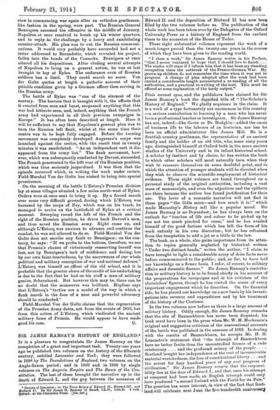BOOKS.
THE OLD PRUSSIAN ARMY.*
'THE military operations which took place between the battle of Jena (October 14th, 1806) and that of Eyhtu (February 8th, 1807) have not secured any very abiding Flays in the general history of the Napoleonic Wars. Many of those who have only a casual acquaintance with that history are probably scarcely aware that an important action was fought at Pultuak. Nevertheless, this period was one of great importance. It is especially noteworthy because during these few months an opportunity was allowed to slip by of anticipating Leipsic and Waterloo, and thus of short- ening by more than eight years the prolonged agony through which the whole of Europe was then passing. Napoleon was at that time thought to be invincible. But the actual force of which he disposed was far from being commensurate with the task which he had set himself to perform. He had to overawe the hostile population of Northern Germany and to keep watch on Austria, whilst at the same time he was about to attack the stolid battalions which the Emperor Alexander could put in the field on their own ground and amidst the rigours of their own climate. To meet these requirements he had, according to Thiere, three hundred thousand men, of whom no less than one hundred and ten thousand were German, Dutch, and Italian auxiliaries. This force was none too numerous even although it was lid by one whom Clausewitz called "the incarnate genius of war." So good an authority as Soulful was of opinion that if, after Napoleon had crossed the 'Vistula, Austria had launched a hundred thousand men from Bohemia on the Oder, "the power of Napoleon would have been ended." But Austria, still staggering under the crushing blow inflicted at Austerlitz, remained passive and allowed the opportunity to escape. This period also marks the zenith of Napoleon's military fame, and, it should be added, the nadir of his blood-guiltiness. He was intoxicated with his own success, " L'orgueil de Napole'on," Be Fezensac says, " sa confiance en sa puissance, avaient 6t6 port& an oomble par la conquete de la Prime. Hien ne lui semblait Impossible, et, dans sea castes projets, ii ne connaissait plus de limits qua cello de sa volonte." It was open to him, after Jena, to have concluded an honourable and highly advan- tageous peace. The King of Prussia, in spite of the entreaties of his high-mettled and courageous Consort, was at his feet, but not even the most humiliating concessions could satisfy Napoleon's boundless ambition. "Fe veux," he said subse- quently to the Emperor Alexander, "qua la Prusee no soit plus one puissance dans la balance politique de l'Europe." In writing to Marshal Heftier he spoke of his relations with the Shah of Persia and of a march to the Indus as "no • Troo to Bolos. Hy General Field.Marshal Freiherr Yon der Gaits. Translated by Captain C. F, Atkinson. London Began Find, Trench, and 17s. ed. nat.] longer chimerical." Hence he refused all overture's. His behaviour to the defeated King of Prussia was brutal- " bourru et greasier," Princess Antoine Radziwill calls it in her memoirs. The callous indifference with which he viewed the sufferings he caused, whether his victims were German and Russian peasants or those devoted French conscripts who were torn from their homes in sunny France in order to lay down their lives on the frozen Russian plains in a cause in which they were no way interested, may be judged from a characteristic episode recounted by Count Chaptal. " Napoldon," Count Chaptal says, "se promenant sur to champ de bataille d'Eylan, convert do vingt-neuf mule cadavres, lee retournait avec Is pied et disait aux Generaux qui l'entouraient ' C'est de la petite espece: It can be no matter for surprise that the wound left in the national mind of Germany rankled deep, and that, when the hour of vengeance at last came, fiery old Marshal Blucher, who was himself obliged to surrender to the conqueror after a gallant struggle, was with difficulty restrained by the Duke of Wellington from destroying the bridge at Paris whose name commemorated the supreme disaster of Germany.
Although, however, the importance of the operations con- ducted immediately after the battle of Jena have been somewhat ignored by the general historian, they have always been regarded with great interest by students of the art of war. Hopfner, who is the classical military historian of this period, says that all the measiiree adopted by Napoleon during the first act of the Polish Campaign, which may be said to close with the battle of Pelle* on December 26th, 18013, were admirable (raueterhaft wad masegebend). The late Major Adams, who contributed so much to encourage the study of military history in this country, and whose name is still green amongst old Staff College officers, chose the operations in question as a subject on which to deliver some highly interesting lectures. Captain Atkinson Las, therefore, earned the gratitude of all English students of the art of war by providing them with an excellent translation, accom. panied by numerous very complete maps, of Field-Marshal Von der Goltz's history of these operations. The Germans excel as military historian; not only on account of their painstaking accuracy, but also because they never allow their patriotism to get the better of their professional judgment, or to belittle their opponents. Field-Marshal Von der Goltz does ample justice to Napoleon's military genius and to the achievements of the troops under his command. His most scathing criticisms are reserved for his own countrymen, especially for Massenbach, whom he appears to regard as the evil genius of the Prussian Army.
After Jena the -demoralization of that Army was complete. The besetting sin of a bureaucratic and highly centralized administration made itself felt. The superior officers were paralysed. Duke Eugene of Wurttemberg, to name a single example, "like all other Prussian officers, hungered for specific orders. . . . He dared not form an independent resolution on his own responsibility." Acts of skill and heroism on the part of individual officers could not avert the impending disasters. One by one the remaining Prussian corps laid down their arms. Magdeburg and other important points were captured by the French. Practically all that remained of the fine Prussian Army was about twenty.five thousand men under General L'Estocq, who were cooped up in Eastern Prussia, and eventually placed at the disposal of the Russian Commander- in-Chief. Napoleon, therefore, turned his attention, in so far as military operations were concerned, almost wholly to Russia.
The line of the Vistula had, contrary to the advice of L'Estocq, being abandoned by the Russian army. Napoleon at once seized the advantage thus offered to him. Be crossed the river in the hope, probably, that he could at once deal a crushing blow to the Russian army, and thus terminate the war. In this he was disappointed. Amongst other reasons, Nature was against him. He had to deal with what he himself called " the fifth element "—the mud of Poland. His own half- starved troops were exhausted. After the battle of Pultusk, therefore, which yielded no decisive result, he went into winter quarters, content with having established himself firmly on the right bank of the Vistula.
He was not allowed to remain quiet for long. The days of eighteenth-century warfare, when commanders went com- fortably into 'quarters at the beginning of winter with a view to commencing war again after an orthodox gentleman- like fashion in the spring, were past. The Russian General Bennigsen assumed the offensive in the middle of January. Napoleon at once resolved to break up his winter quartera, and to reply—to the challenge by a heavy and annihilating counter-attack. His plan was to cut the Russian communi- cations. It would very probably have succeeded had not a letter addressed to Bernadotte, which revealed his project, fallen into the hands of the Cossacks. Bennigsen at once altered all his dispositions. After eluding several attempts of Napoleon to bring on a general action, he was at last brought to bay at Eylau. The endurance even of Russian soldiers has a limit. They could march no more. Von der Goltz quotes at length a pathetic account of their pitiable condition given by a German officer then serving in the Russian army.
The battle of Eylau was "one of the sternest of the century. The horrors that it brought with it, the efforts that it exacted from man and beast, surpassed anything that this war bad hitherto seen, and, indeed, anything that the French army had experienced in all their previous campaigns in Europe." It has often been described at length. Here it will be sufficient to say that Napoleon's general plan was to turn the Russian left flank, whilst at the same time their centre was to be kept fully engaged. Before the turning movement was completely developed Augereau's corps was launched against the centre, with the result that in twenty minutes it was annihilated. "As an independent unit it dis- appeared from the army list." The flank movement, how- ever, which was subsequently conducted by Devout, succeeded. The French penetrated to the left rear of the Russian position, which was thus seriously jeopardized. It was then that the episode occurred which, in writing the work under review, Field-Marshal Von der Goltz has wished to bring into special prominence.
• On the morning of the battle L'Estocq's Prussian division lay at some villages situated a few miles north-west of Eylau. Orders were at once sent to bring it up. By a forced march over some very difficult ground, during which L'Eatocq was harassed by the corps of Ney, which was on his track, he managed to arrive on the battlefield of Eylau at a critical moment. Sweeping round the left of the French and the right of the Russian position, he drove back Davout's men, and thus saved the Russian army. Night came on, and although L'Estocq was anxious to advance and continue the combat, be was not allowed to do so. Field-Marshal Von der Goltz does not ascribe any fault to Bennigsen; on the con- trary, he says : "If we probe to the bottom, therefore, we see that Prussia's chance of victoriously reasserting herself was lost, not by Bennigsen's lack of confidence and daring, but by our own faint-heartedness, by the narrowness of our whole political and military conception of war and national defence." L'Estocq was himself an officer of the old school, and it is probable that the greater share of the credit of his undertaking is due to the fact that he had on his staff a man of military genius, Soharnhorst. But however this may he, there can be no doubt that the manceuvre was brilliant. Hopfner says that L'Estocq's "tactics are a model of the way in which a flank march in the face of a near and powerful adversary should be conducted."
• Field-Marshal Von der Goltz claims that the regeneration of the Prussian Army dates, not from the events of 1813, bet from this action of L'Estocq, which vindicated the ancient military fame of Prussia. He would appear to have made















































 Previous page
Previous page